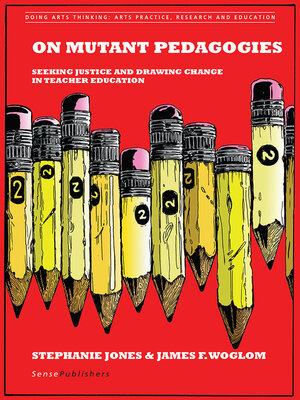On Mutant Pedagogies
ebook ∣ Seeking Justice and Drawing Change in Teacher Education · Doing Arts Thinking: Arts Practice, Research and Education
By Stephanie Jones

Sign up to save your library
With an OverDrive account, you can save your favorite libraries for at-a-glance information about availability. Find out more about OverDrive accounts.
Find this title in Libby, the library reading app by OverDrive.



Search for a digital library with this title
Title found at these libraries:
| Library Name | Distance |
|---|---|
| Loading... |
"This ground-breaking book on pedagogy, research, and philosophy in teacher education expands the imagination of justice-oriented education and arts-based scholarship. Based on a multi-year study of Jones' use of feminist pedagogies, the book seamlessly moves between classroom practice, theory, and philosophy in a way that will offer something for everyone: those who are looking for new ways of doing teacher education, those who hope to better understand philosophy, and those who seek new ways of doing inquiry and scholarship.
Demonstrating through pedagogy, method, and form that we "have more power than we think" and don't have to repeat what has been handed down to us, the creators critique the restrictions of traditional teacher education and academic discourse. This critique prompts a move outward into unpredictable spaces of encounter where a "maybe world" might be lived in education. In this way, Jones and Woglom don't make the case for a certain kind of pedagogy or scholarly inquiry that might be repeated, but rather they invite educators and researchers to take seriously the philosophical ideas of Deleuze, Guattari, Barad, and others who argue that humans are in a constant aesthetic process of becoming with other humans, non-human life, and the material world around them. Thus, education – even teacher education – is not about reaching an already known end goal, but growing and changing through multiple ways of being and perceiving in the world. The authors call this mutant pedagogies and show one ethical path of mutating."
Demonstrating through pedagogy, method, and form that we "have more power than we think" and don't have to repeat what has been handed down to us, the creators critique the restrictions of traditional teacher education and academic discourse. This critique prompts a move outward into unpredictable spaces of encounter where a "maybe world" might be lived in education. In this way, Jones and Woglom don't make the case for a certain kind of pedagogy or scholarly inquiry that might be repeated, but rather they invite educators and researchers to take seriously the philosophical ideas of Deleuze, Guattari, Barad, and others who argue that humans are in a constant aesthetic process of becoming with other humans, non-human life, and the material world around them. Thus, education – even teacher education – is not about reaching an already known end goal, but growing and changing through multiple ways of being and perceiving in the world. The authors call this mutant pedagogies and show one ethical path of mutating."







